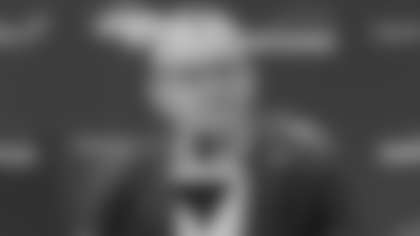With the Broncos and Eagles set to face off on Sunday, there is no former player who connects these two franchises more prominently than Pro Football Hall of Famer Brian Dawkins. In 13 years with Philadelphia and three in Denver, Dawkins was nothing short of remarkable — a fearsome safety who could wreak havoc all over the field.
This year, Dawkins has decided to share many of the stories from that extraordinary career, as well as the lessons of his life that have shaped his outlook, in a new memoir titled "Blessed by the Best: My Journey to Canton and Beyond." Recently, we spoke with Dawkins to reflect on his time in Denver and to hear more about the book, which is available for purchase on briandawkins.com (including autographed copies) with half the net proceeds going to his charitable foundation.
BS: Obviously, you came to Denver after 13 tremendous years in Philadelphia. In your book, you mentioned how difficult it was to play against the Eagles during that first season with the Broncos. When you made that decision as a free agent, did you know that game would be on the schedule? Did it play a part in your decision?
BD: "At the time, no, I didn't know we were going to be playing the Eagles. … In the book, I mentioned the fact that one team wanted [me]. They wanted me so badly, and the other team, to me, was kind of tolerating me. And that's something that my good friend told me about. He said, 'It's better to be appreciated than tolerated.' And that's what I felt. When I came to Denver, that is what I felt in the building and from the fan base."
BS: You touch on late Broncos Owner Pat Bowlen in the book, mentioning how he was "first-class" in how he led the team. How big a factor was he in your decision?
BD: "Tremendous. I know how everybody [says], 'Well, they paid you more.' It wasn't just that, because I had other individuals that wanted me to come join their team. But you have to look at the history of the Broncos and who they had playing different positions at different times and then the culture that was in Denver, starting from the top. So that meant a whole [lot], to have a first-class organization want me to come to add what I had left in the tank to hopefully help get the Broncos over the hump. … I remember coming there and I remember they would have — I forget what they called it — like, 'Guru Day.' So, Guru Day is literally having ART [Active Release Techniques] specialists and all of these different individuals come in to the facility to help work you out. So that's one of the things that I was extremely, not fearful of, but I was like, 'I have all these individuals in Philadelphia that I go to to help me get my body back right to play. How am I going to find that in Denver?' Then when I go to Denver, they basically provide all these individuals free of charge, where I was having to pay for it before. So, again, [that's a] first-class organization, being able to think outside of the box. And then, like I said, Mr. B … in the book I talk about seeing him absolutely come in and just kill the elliptical every day on the highest level, going for like an hour. I'm like, 'This dude is unbelievable when it comes to that!'"
BS: In your first year in Denver, you earned a Pro Bowl and an All-Pro selection. In the book, you said that aside from your election into the Pro Football Hall of Fame, that season was your greatest accomplishment as a football player. Do you feel like you were more proving something to doubters or proving something to yourself?
BD: "Man, that's a great question. First of all, I'm someone — if you've read the book — I'm someone that uses motivation. Like, you say something that I can't do, oh, thank you for that. That adds a log to my fire. So, coming from Philadelphia and really feeling like they felt that I was basically done, so to speak, I'm like, 'OK.' That motivated the heck out of me to come into that next year to go out and prove me right. I'm not trying to prove them wrong. I'm going to prove me right, because I didn't want to give anybody power over me. So I'm using this fuel, and I'm about to go prove me right that I have a whole lot more left in the tank. Not only did I have a lot more in the tank; I was blessed not to just come there and go to the Pro Bowl. I was blessed to be an All-Pro. That's different. That's a different ballgame. So you go from the NFC to the AFC to earn the respect of the individuals over there in that one year, yes — and as a matter of fact, that was the most tackles in a season that I had ever had at, I think I was 35 at the time. So absolutely I used it as motivation — but, again, it was to prove me right, not just to prove them wrong."
BS: When I think about your time here, I also think about all the other great safeties who have come through here — Steve Atwater, Dennis Smith, John Lynch. Do you view yourself as part of that lineage too?
BD: "Absolutely. If you haven't looked at my social media feed — my Instagram — when Steve went in [the Pro Football Hall of Fame], pssh, I'm a fanboy, right? So, absolutely! … Atwater, how he played the game, he's one of the individuals [after whom] I modeled the aggression that I played with. … He and Dennis set the bar. Like, this is the way that you play safety in Denver, period. Now, you can do other things — you can get picks, you can cause fumbles — but you absolutely snot-bubble people. I'll say it like that. That's the kind of tradition there, and I wanted to add my version of it to those, and adding John in there as well. But Steve and those guys, they set the bar, and they set it extremely high for myself and others to come to add our version of it to the Denver culture, so to speak."
BS: Those first two seasons were pretty challenging from the lens of team success, but that third year must have been absolutely wild. With Tebowmania and the win streak y'all had, and of course the playoff win over Pittsburgh, what stands out to you about that experience and that season?
BD: "Obviously then John Fox — Foxy — had come in, right? Coach Fox had come in, and I wish I could have played more years for Fox, to be honest with you. But how we jelled — and we basically did things to allow for the late-season push and magic of Tim doing things in the fourth quarter. If you look at the defenses we played, how well we bonded and picked up our game in order to have those late pushes in the season, how well the special teams — [kicker Matt] Prater … and [punter Britton] Colquitt — they were absolutely crushing the ball, kicking 60-yarders, 50-yarders on a grand clip, pinning teams back, and we'd go out to do our job to keep the points down. Just the overall flow and the confidence that we had that we can keep the score down in order for the late runs in the fourth quarter to happen, because that's usually when things would happen, in the fourth quarter. But we knew that. And again, we bonded together during those tough times, during those first two years, and then when Fox got here, there was the expectation for us to do things differently, and we did."
BS: One of the guys you were around then was Von Miller, and you talk about how exceptional he was even then as a rookie. Now, what he's going through changing teams, you obviously went through something similar going from Philadelphia to Denver. The reality now where players don't spend their entire career in one place, how do you balance that with maybe the happy knowledge that he'll get to go play for a playoff contender right off the bat?
BD: "That's the thing about it. I didn't get traded, right? I was literally not brought back, so there is some differences there. When you are traded, the way that I see it, that team still values you, and they value you so much that they know they're going to get a bunch for you. So that's different. They still value you. It still hurts. Don't get me wrong — it still hurts. But they value you. When you're … not even offered a contract that's worth even looking at, then that's different, that's a different feeling to it. But here's the thing, though: No matter how you leave and go to another team, the way that I've come to understand it is that I'm supposed to go to this next team to, first of all, earn the respect of my new teammates, to do things the first-class way in order to create a new family that … they can depend on me and I can depend on them for us to go handle our business to hopefully go win a ring, right? So I was blessed to talk to a lot of individuals, guys that I respect, as I was going through that transition, going from Philadelphia. And I say it in the book that literally I went through a mourning period, because to me it was like you lose somebody in your family. That's how I felt. That's literally how I felt, because of how things were done. But I knew I had to be everything and then some going to Denver. When I say 'then some,' in Philadelphia I had already earned the right from my teammates. I had already shown them what I can do and who I am. When I then went to Denver, it was brand new. I had to earn that right. So again for Von, that's an opportunity. That's an opportunity for a new band of brothers to see the quality cat that you are, in and out of the locker room. And you bond and you grow a new family. That blessed me, to be able to do it that way and then have those individuals in Denver once again earn that respect and then they began to trust me, and knowing whatever I can do to help, I'm going to do it."
BS: In your book toward the end, you talk about how you were able to make amends with Philly. Even during your time in Denver, could you understand that the love from fans, teammates or staff members never went away?
BD: "Here's what I had to do, though. Even when I was playing in Denver, it wasn't after I retired that I basically had to forgive. I know forgiveness to be something that's not for them but it was for me. Because if I held on to the bitterness or held on to any anger or hatred, that stuff would have affected me and my opportunity to then bond with my new team. … So now I had to forgive them in order for me to be everything that I could for my new team. That's why I did it. I was not going to let the decision of a couple of people prevent me from then having the ongoing love, respect and appreciation for my teammates, yes, and for that fan base. That's a life thing. That's not just a football thing. That's a life thing. Don't ever allow the decision of one person to prevent you from being all you can be for so many other people by holding on to regret, holding on to anger and bitterness. I think it was Nelson Mandela that said that bitterness is like you offering poison to somebody else, but you're actually poisoning yourself. Does that make sense? It's like you're hating, hating and hating, hating and thinking your hating is going to hurt them, but you're literally poisoning yourself with that same hatred. And I did not want to do that. It's not that I hated, but there was a strong sense of anger there, and I had to get rid of that for me to be everything that I could be for my new team."
BS: Half of the net proceeds from your book will go toward your charity, the Brian Dawkins Impact Foundation. What do you look forward to being able to do through that aim?
BD: "The Brian Dawkins Impact Foundation is a foundation that we have these pillars called the Brian Dawkins Value Packages. And in those value packages are values from me. These are the things that I have learned from my life, grown through in my life and things that I do things differently because I've learned these things. I believe I'm supposed to give these things away. The first pillar so to speak is in the mental health realm. I call it 'cerebral wellness.' I don't talk about mental health; I call it 'cerebral wellness.' It's too much of a negative connotation to this day around the word 'mental.' Just saying the word 'mental,' I know coming from where I came from in Jacksonville, Florida, just the word 'mental' was negative — and it's not. The definition has nothing negative, but to say it in my neighborhood was a negative thing. So I've changed that to cerebral wellness. The second thing is financial literacy. There's just certain things that we weren't taught coming from where I came from in Jacksonville that I know now as a professional that I could have done things differently and approached life differently from an earning … standpoint [or] thought process that was not taught growing up where I grew up in the school system. And then finally single-parent assistance programs. I was blessed to have my mom and my dad in my life. … But there are individuals that are growing up — a lot of them were growing up in my neighborhood — that did not have a father. … Two of them lost their lives to the street. So in those relationships I had with them, I noticed that they were free and felt free to just willy nilly do anything they wanted to do in certain instances, and I'm like, 'Man, that's nowhere in the world I can do that and go back home,' because I had that authority figure in my life, that loving authority figure. So what I want to do now is to bless through the foundation, bless those single parents that are doing the absolute best they can with what they have but they need assistance. So that's what we're going to be doing. We're going to be doing other things, but those are kind of the three things that we're stepping out right away to help. Now we started out in the mental health and cerebral wellness packages that we have [in] nine schools in Jacksonville and seven in Philadelphia right now, [and we're] looking to expand that. So the places that have blessed me, I'm going to be blessing. So Denver, I'll be blessing Denver at some point here soon, lord willing, and then South Carolina. I went to school in Clemson. So those regions will get the first, I guess, blessings from the Brian Dawkins Impact Foundation. And then from there, as much as we get in is as much as we'll be able to reach out to bless people."
BS: One of the things that really struck me in the book is the response you got from people who had been contemplating self-harm and were inspired to get help after hearing your Hall of Fame speech. How do you react when you hear those things?
BD: "I'm humbled by that. One of the first things I say if it's a face-to-face thing, or if it's online, I tell them in so many words, 'I'm glad you're still with us, brother. I'm glad you're still with us, because there's so much more for you to do on the other side of the pain that you're going through.' … I didn't expect it to the level that I've gotten it. When I tell you get DMs, I'm talking about from Greece, from Turkey. … I literally have to push 'Translate' because I don't know what they're actually saying. Seriously. So that message went out far beyond the borders of the U.S. and to the world. And so that was even a stronger indication of the need for individuals to understand that it's OK not to be OK. It is. It's OK not to be OK. But it's not OK to stay not OK, because there's help for you. There was help for me that whole time I was going through what I was going through. But I never reached out until that last event happened and I finally, through the urging and the pushing of my beautiful wife and Emmitt Thomas, I went and got help. … When I got the help, I begin to see. I come down off my emotions, and I begin to hear from a spiritual level of some of the things I need to stop doing and some of the things I need to start doing. And I've picked up and created a discipline in my life, and I want to give you this: I pray, I read, I meditate and I journal every morning now. And that started after the process. It started after the process of me growing through that time period, having those conversations and then figuring out, 'What can I do to stay winning?' I say it like that: 'to stay winning.' That's the formula. It's other things [too]. If you go to briandawkins.com, there's something on there called the blueprint challenge, and that's literally the thing that I created for myself in order for me to stay winning in life. Now, I do variations of that, but the morning routine is the same, no matter if I've got to get up early or I can sleep in late; I still get up at least an hour before I have to leave the house so I can do these practices. That's the power in this. That's one of the things that I constantly say that we as men, especially — we as men, our silence is literally killing us. It's literally killing us. So to speak up and speak out to the right people — and not everybody needs to know what's going on with you, that's the other thing. See, we think that when you say something to somebody then everybody knows what's going on with you. No, no. Maybe there's one person in your life, maybe there's two people in your life, maybe it's a professional. You don't trust the people, OK, let's go to a professional. But that professional is bound by law to hold on to what you tell them, right? So you can go speak real to them and get some help, some resources. For you to be the best version of yourself, so you can begin to get rid of the toxins in your life from the past, so that your present can be such a pleasant place to be and that you can begin to envision a worthy future to go after. … That's the space that I'm in now, like a mentality coach, that type of motivational, inspirational speaker type of cat. That's the space I'm in. All of that started when I was playing. As I was going to Denver, towards the end of my career, I was doing a whole bunch of things like that — motivation and helping guys through some of the tough times we were going through. Now, I've been able to then do this thing on a different level where I am now, and obviously the Hall of Fame, speaking on that stage, was truly an introduction to the next chapter of my life to the world."
BS: As a professional athlete, for the past two or three decades, you've had to trust journalists or writers to tell your stories for you. You've had to trust them and trust that they'll do them justice. But being able to tell your stories yourself now with this book, how valuable of an experience was this for you?
BD: "It was extremely valuable, and that's something that I did not think I would do. I didn't grow up thinking I'm going to write a book. I didn't grow up thinking I would ever have 'author' beside my name. From here on, I'll have 'author' beside 'Brian Dawkins.' I never thought that. But the things that I have gained in my life, the way that I'm blessed to see life, see my past experiences as they would tell you in a psychiatrist's office, how I reframe things now to empower me where I am today, I believe I'm not supposed to hold on to wisdom. When I gain wisdom, I'm not supposed to hold on to it. If I've learned how to grow through those things and I see things through a different lens, I'm supposed to share that with people, to bless them wherever they find themselves. That's this book. So it's not necessarily a football book — there's some football in it — but it's so much of the things that's Blessed by the Best because ultimately the things that I've grown through in my life were the best for me. In those moments of darkness, I had the best in that moment to speak life into my situation. It is my prayer that people, when they read it, and you go down my journey, so to speak, that you enjoy it. And the other thing is I wanted it to read like I'm talking to you. Like, I say 'cat' and 'Jack' a lot. I wanted that in the book. I wanted you to hear me, how I talk, and I wanted it to sound like we're having a conversation. But when you look back over your life, you begin to realize or hopefully realize, 'Wow, I'm stronger in this area because of that thing that hurt me so bad at that time. I do things differently because that person mentioned to me in that instance to do something differently.' And, again, in the moment it's painful, but I've come to understand that it's often times some of the greatest strengths that we gain in life usually comes from discomfort. It doesn't come through being comfortable."














